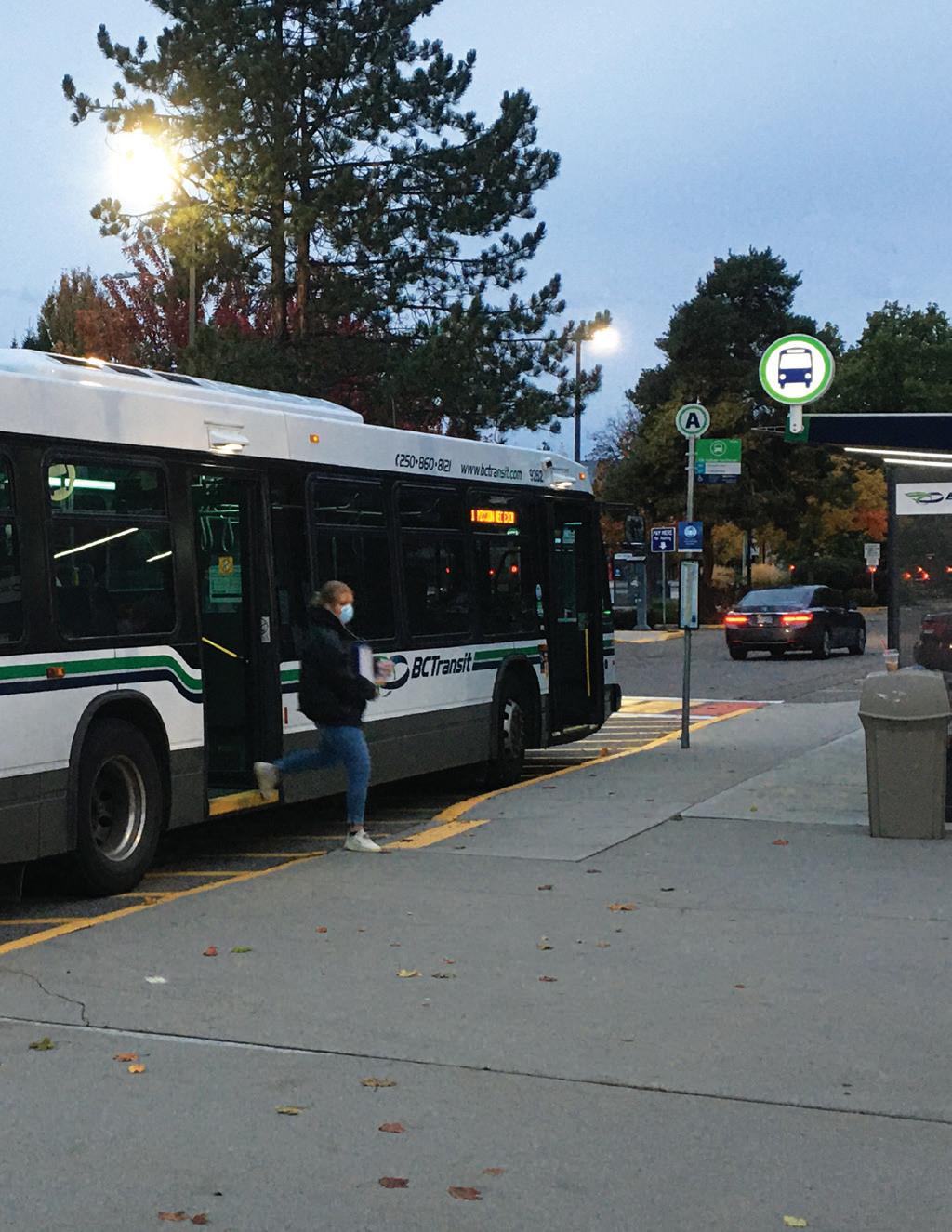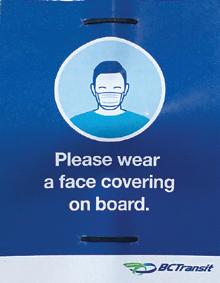
4 minute read
Transportation and Mobility
We will promote transportation and land use approaches that enhance movement throughout the region and reduce our collective reliance on vehicles.
Regional planning is critical in improving connections and ensuring residents have transportation options to significant work and community hubs across the region. As a regional governing body, we are able to help shape transportation decisions in ways that achieve greater mobility and benefit the region as a whole.
Green Vehicle Policy
In an effort to help support the Climate Action Charter goal of carbon neutrality and reducing Greenhouse Gas Emissions (GHG), the Regional Board endorsed a new Green Vehicle and Equipment Policy for the RDCO.
As an organization, we’re committed to moving our operations towards carbon neutrality . While the reduction of greenhouse gas emissions can be accomplished in various ways, one important area includes the introduction of alternate fuel vehicles and equipment into everyday operations. As RDCO fleet vehicles and equipment are a significant contributor to overall GHG emissions the development of an emissions reduction strategy through the use of alternate fuel sources such as biofuel, natural gas, methane and electricity can along with conservation efforts, assist to lower greenhouse gas production.
When appropriate and financially and technically possible, alternate/green fuel vehicles and equipment will be considered for operations to assist in lowering polluting emissions .
Pandemic Safety Paramount
Throughout the global pandemic, the Kelowna Regional Transit system and BC Transit have been at the forefront of passenger and staff safety efforts. The goal has been to ensure confidence for those using transit.
While initially, many routes were adjusted in response to COVID-19 and fares were not collected to reduce contacts, over the months as the Provincial Restart rolled out, services have also increased. Safety measures included capacity management, physical distancing, enhanced cleaning and sanitation at BC Transit facilities and buses, onboard protective barriers for drivers, requiring passengers wear face coverings and increased public awareness and education . These measures have helped to ensure everyone has a safe experience riding conventional transit and handyDART vehicles
Everyone continues working together to create a comfortable and respectful environment on board the Kelowna Regional Transit fleet .
Transit Recovery Funding
Transit provides an increasingly important service for people across the region .
The Kelowna Regional Transit System will receive $7.3-million to support transit recovery. This is part of the Government of Canada and Province of BC’s Safe Restart plan
This funding will help cover the revenue losses incurred as a result of the COVID-19 pandemic and allow the regional partners and BC Transit to continue providing safe, affordable and reliable transit service. It also ensures essential service levels can be maintained and that fares remain stable and affordable as the region recovers from the economic impacts of COVID-19.

Transit Stops License Of Occupation
Regional Board approval of a five-year License of Occupation Agreement with the City of Kelowna paved the way for several transit stops along Springfield Road within Mission Creek Regional Park
The agreement allowed the relocation of the Leckie Road stop; improvement of the stop at Durnin Road and a new transit stop at the Ziprick Road intersection of the park. It also renews a license for a transit stop on the southwest corner of Ziprick Road.
CENTRAL OKANAGAN’S FIRST TRANSPORTATION PLAN
The Regional Transportation Plan was reviewed and endorsed by each local government in the Central Okanagan. The plan identifies transportation projects and priorities that will help build and maintain a healthy, thriving and connected future for the Central Okanagan region .
This is the first region-wide transportation plan for the Central Okanagan
It was developed following more than two years of technical studies, public consultation and unprecedented region-wide collaboration across multiple levels of government
Moving forward, the Regional Transportation Plan will help Central Okanagan governments work together to seek funding for and implement transportation investments that benefit the entire region.
The new plan along with the supporting Regional Bicycling and Trails Master Plan and Regional Disruptive Mobility Strategy will help create a region where more people can choose sustainable and affordable transportation options for the Central Okanagan. It sets direction for Central Okanagan governments to work together to:
• Move people and goods more efficiently
• Achieve fast and reliable transit throughout the region
• Improve local connections to regional transit
• Create a safe and convenient region-wide bike and trail network
• Incorporate new mobility options
• Reduce future greenhouse gas emissions
The Regional Transportation Plan aligns with the strategic direction of Provincial plans, including Clean BC and the BC Economic Framework The interconnected projects, programs, and policy recommendations in the plan will work together to prepare for future population growth, reduce future greenhouse gas emissions, help people of all ages and abilities get around, and help economic recovery post COVID-19 .
Bike To Work And School Week
Initially scheduled for the last week of May, the spring 2020 Bike to Work and School Week event was postponed, a casualty of the coronavirus pandemic and in response to direction of the Provincial Health Ministry.
The annual effort to promote the health and transportation benefits of pedal-power has grown each year in participant numbers, kilometers logged and reduced polluting emissions. By late fall, in partnership with 12 community sponsors, a creative virtual GoByBike Week was held using a new provincial website and logging trip platform. In total, 1,750 people registered to participate, riding 60,769 kilometres and saving 13,155 kilograms of Greenhouse Gas emissions.
Local organizers and partners in conjunction with the GoByBike BC Society look forward to hosting these popular pedaling events in-person, when it’s safe once again to stage this activity
One Less Car
The Regional Air Quality program Clean Air and Safe Routes 4 Schools program is designed to increase participation in active transportation at elementary schools while reducing the number of vehicles used for travel to and from school in order to reduce emissions.
During 2020, a School Travel Plan was created for South Kelowna Elementary and while the plan for George Pringle Elementary school was updated .
2021 Transportation And Mobility Initiatives
• Transit management
• Enhancing partnership with BC Transit
• Sustainable transportation demand management (TDM) programs
• HandiDART service management
• Sustainable Transportation Partnership Central Okanagan transition to a new operational system for the region .











